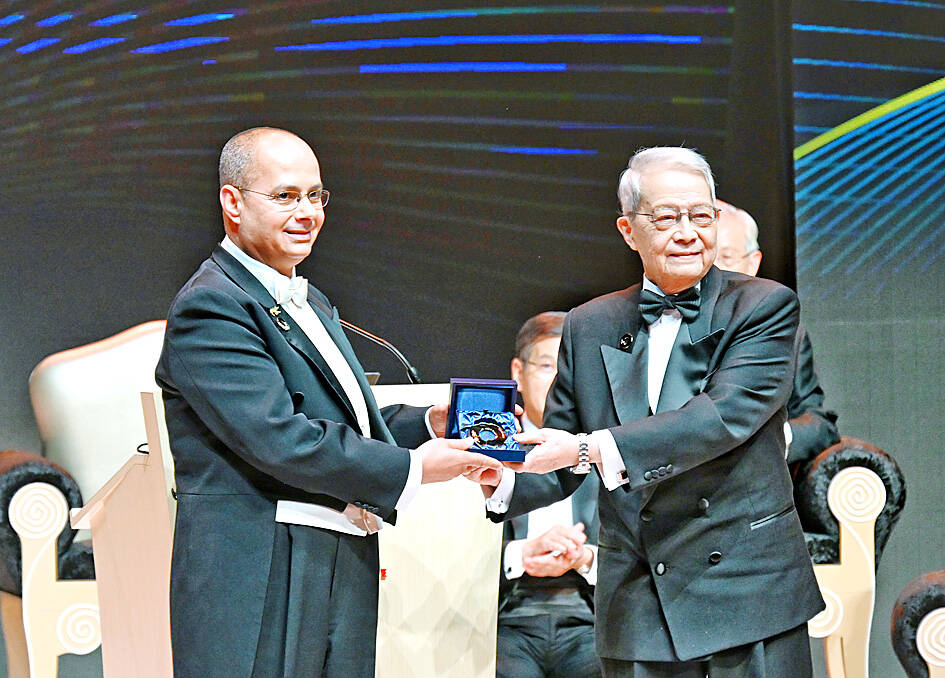
Taiwan’s Bold Path to Carbon Capture and Water Harvesting
Omar Yaghi, a prominent figure recently awarded the Tang Prize in Sustainable Development, is advocating for Taiwan’s potential in creating revolutionary materials to address two pressing global challenges: carbon capture and water scarcity. Speaking at the Tang Prize Masters Forum held at National Yang Ming Chiao Tung University in Hsinchu, Yaghi emphasized the importance of developing advanced materials capable of both capturing carbon dioxide from the atmosphere and harvesting water from air.

As the James and Neeltje Tretter chair professor of chemistry at UC Berkeley, Yaghi presented his groundbreaking work on covalent organic frameworks (COFs). He noted the remarkable capabilities of these materials, which can capture carbon dioxide efficiently. “I would say the scientific challenge of capturing carbon dioxide from air is solved. What remains is for Taiwanese to scale up this material,” Yaghi explained, suggesting that Taiwan is uniquely positioned to undertake this crucial task.
The Science Behind COFs
Yaghi detailed that the COFs pioneered in his laboratory are crafted using some of the strongest chemical bonds, offering enhanced stability and energy efficiency compared to existing carbon capture methods. Unlike traditional techniques that often rely on amine solutions or solid materials, COFs boast a remarkable lifespan and real commercial viability potential, capturing one millimole of CO2 per gram for over 100,000 cycles. Furthermore, they are particularly effective in settings that process flue gases, a fact underscored during the forum.
The chemist’s metal-organic frameworks (MOFs) have already seen practical application in the industry, but he firmly believes that COFs could transform Taiwan’s material landscape. He reaffirmed, “Taiwan is the only country that has the boldness to scale up and manufacture COFs.”
Leveraging Taiwan’s Strengths
During the panel discussion, Albert Yeung, director of the Institute of Environmental Engineering at the same university, inquired about Taiwan’s specific advantages in the production of COFs. Yaghi highlighted Taiwan’s skilled workforce, capable of navigating the entire process from design through to manufacturing swiftly. He praised Taiwan’s companies for their agility and previous experience in similar ventures, noting that they are primed to embrace this emerging technology.
Additionally, Yaghi mentioned an inspiring project from Death Valley, California, where his team developed a sunlight-powered device to extract water from the atmosphere. In Taiwan’s humid climate, this technology could yield significantly better results. One ton of MOF could potentially generate 3,000 liters of clean water daily using solely ambient sunlight, with the capability of producing an astonishing 600,000 liters per day when augmented with electricity.
“So I think this is now ready to be handed over to somebody in Taiwan to manufacture, to modify and make more robust as a device,” he stated.
Collaboration Opportunities
Lee Tzong-ming, senior vice president at the Industrial Technology Research Institute, echoed Yaghi’s sentiments, asserting that Taiwan holds the technical prowess to produce MOFs and COFs, should collaborative opportunities arise. He emphasized that local firms, such as Formosa Petrochemical Corp and CPC Corp, possess the research and engineering capabilities necessary to embrace this innovative technology. This could have significant applications in power plants and any industries where flue gas emissions are prevalent.
A Future-Facing Initiative
The Tang Prize, established in 2012 by Taiwanese entrepreneur Samuel Yin, recognizes exceptional contributions in sustainable development and other crucial fields. Yaghi’s call to action for Taiwan could represent an exciting new frontier in sustainable technology.
As the world grapples with climate change and water scarcity, the vision set forth by Yaghi may not only lead Taiwan towards a greener future but also establish the island as a global leader in sustainable material production. With Taiwan’s track record in innovation and speed, the time to act is now. By seizing this opportunity, Taiwan could set a precedent for countries around the globe, demonstrating the essential role of science in solving environmental challenges.
This evolving narrative around COFs and Taiwanese capability in sustainable technology is just the beginning, and the ripples of this innovative approach could soon be felt worldwide.
Emerging technologies in sustainable development hold promise for the future.















